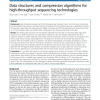Free Online Productivity Tools
i2Speak
i2Symbol
i2OCR
iTex2Img
iWeb2Print
iWeb2Shot
i2Type
iPdf2Split
iPdf2Merge
i2Bopomofo
i2Arabic
i2Style
i2Image
i2PDF
iLatex2Rtf
Sci2ools
122
Voted
BMCBI
2010
2010
Data structures and compression algorithms for high-throughput sequencing technologies
Background: High-throughput sequencing (HTS) technologies play important roles in the life sciences by allowing the rapid parallel sequencing of very large numbers of relatively short nucleotide sequences, in applications ranging from genome sequencing and resequencing to digital microarrays and ChIP-Seq experiments. As experiments scale up, HTS technologies create new bioinformatics challenges for the storage and sharing of HTS data. Results: We develop data structures and compression algorithms for HTS data. A processing stage maps short sequences to a reference genome or a large table of sequences. Then the integers representing the short sequence absolute or relative addresses, their length, and the substitutions they may contain are compressed and stored using various entropy coding algorithms, including both old and new fixed codes (e.g Golomb, Elias Gamma, MOV) and variable codes (e.g. Huffman). The general methodology is illustrated and applied to several HTS data sets. Result...
Related Content
| Added | 09 Dec 2010 |
| Updated | 09 Dec 2010 |
| Type | Journal |
| Year | 2010 |
| Where | BMCBI |
| Authors | Kenny Daily, Paul Rigor, Scott Christley, Xiaohui Xie, Pierre Baldi |
Comments (0)

